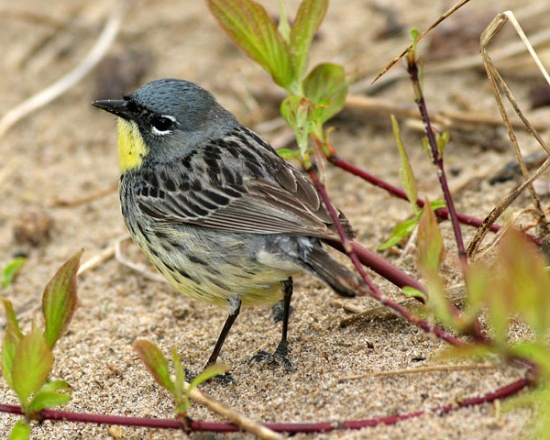- Setophaga kirtlandii
Dendroica kirtlandii
Identification
4.75 inches Thin, pointed bill, broken eye ring, grey nape and upperparts, yellow throat, breast and belly, white undertail coverts, streaked sides and flanks, dull white wing bars, dark legs
Distribution
Nests primarily in the northern Lower Peninsula of Michigan. In 2007 the species was found nesting in nearby areas of Wisconsin and Ontario, Canada. Migrates across the southeastern United States to its wintering grounds in the Bahamas. Accidental in north, west, and east of breeding range.
Taxonomy
This is a monotypic species.
Formerly placed in genus Dendroica.
Habitat
Jack pine forests.
Behaviour
Its nests generally are concealed in mixed vegetation of grasses and shrubs, lined with moss and built by the female. 4-5 cream eggs are laid, and are incubated for 13-16 days.
The diet of the warbler includes many different insect species at various developmental stages, including caterpillars, butterflies, moths, flies, grasshoppers, as well as ripe blueberries.
References
- Clements, JF. 2011. The Clements Checklist of Birds of the World. 6th ed., with updates to August 2011. Ithaca: Cornell Univ. Press. ISBN 978-0801445019. Spreadsheet available at http://www.birds.cornell.edu/clementschecklist/downloadable-clements-checklist
- Avibase
Recommended Citation
- BirdForum Opus contributors. (2024) Kirtland's Warbler. In: BirdForum, the forum for wild birds and birding. Retrieved 28 April 2024 from https://www.birdforum.net/opus/Kirtland%27s_Warbler




